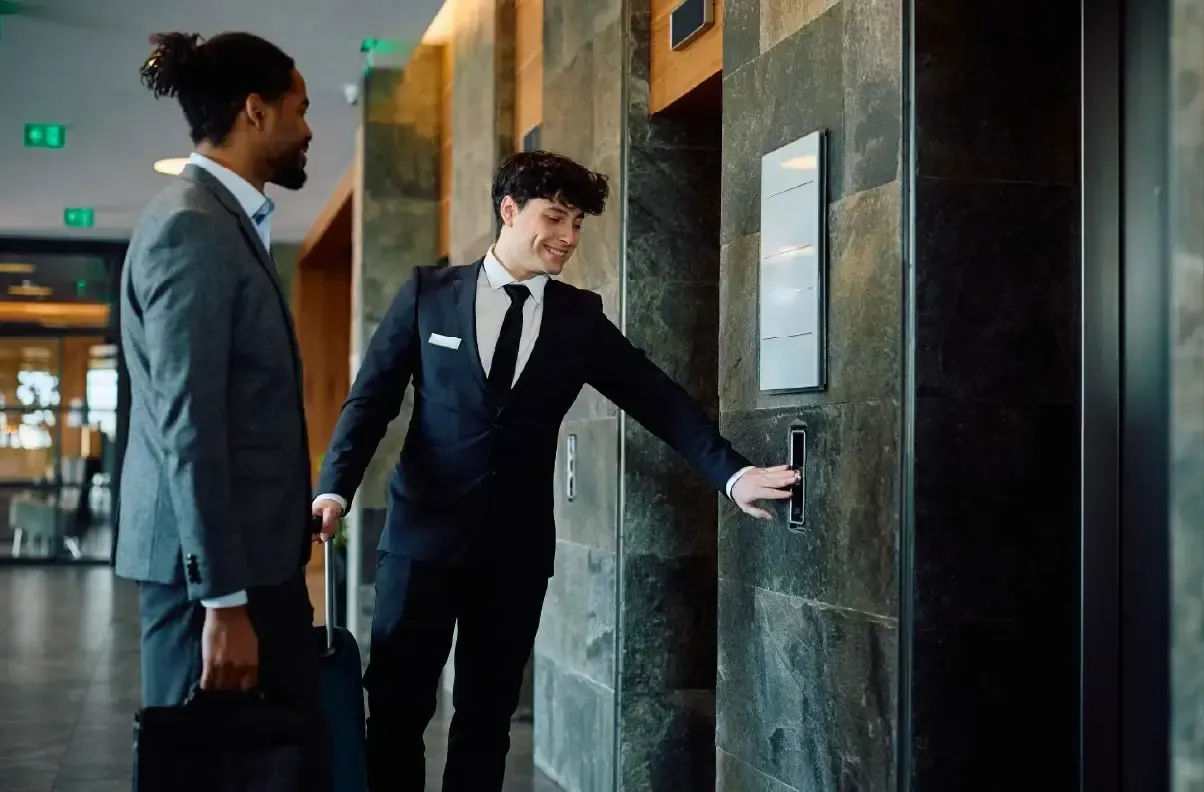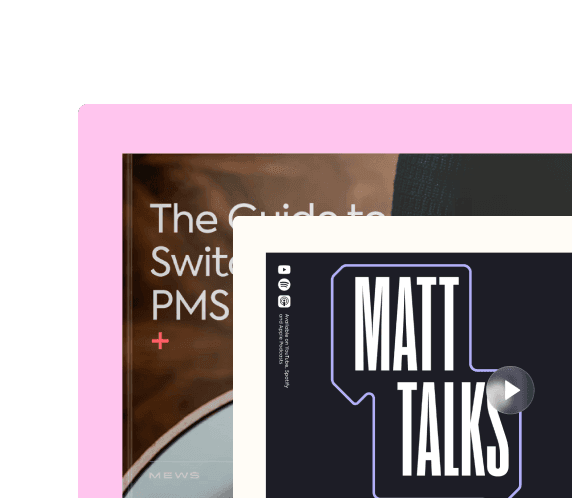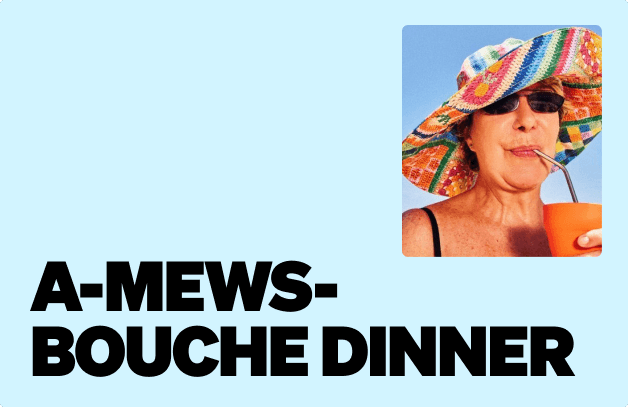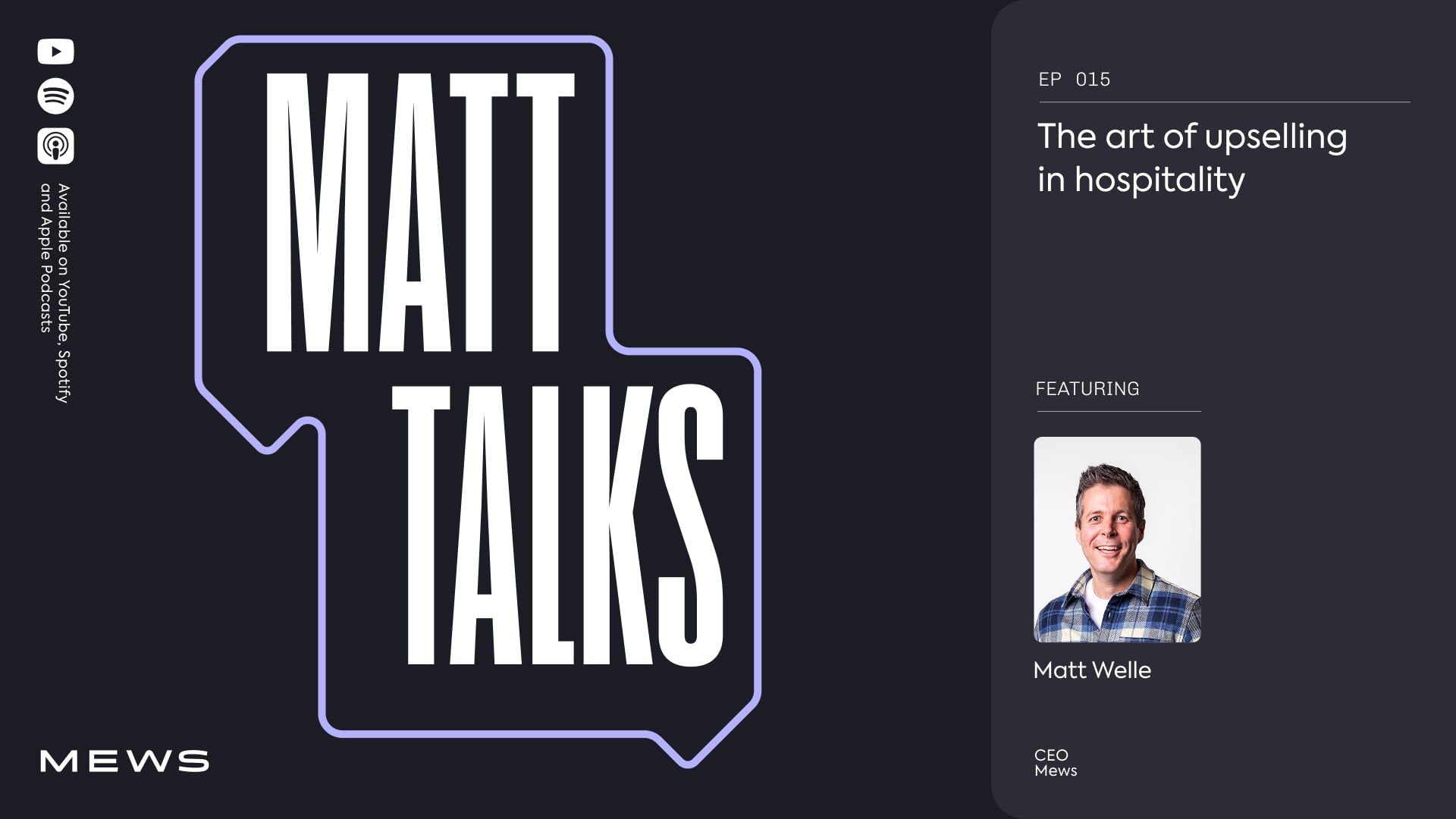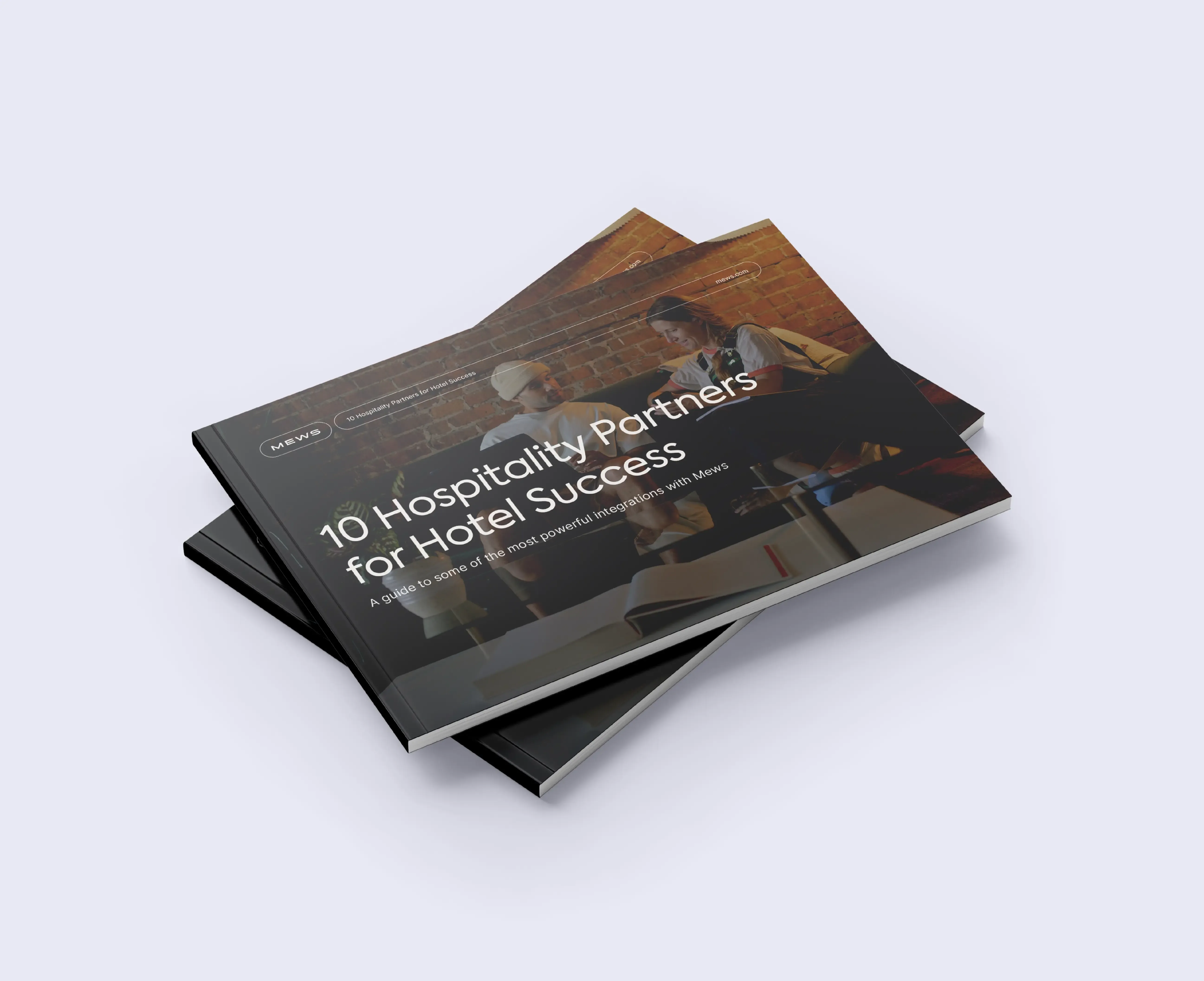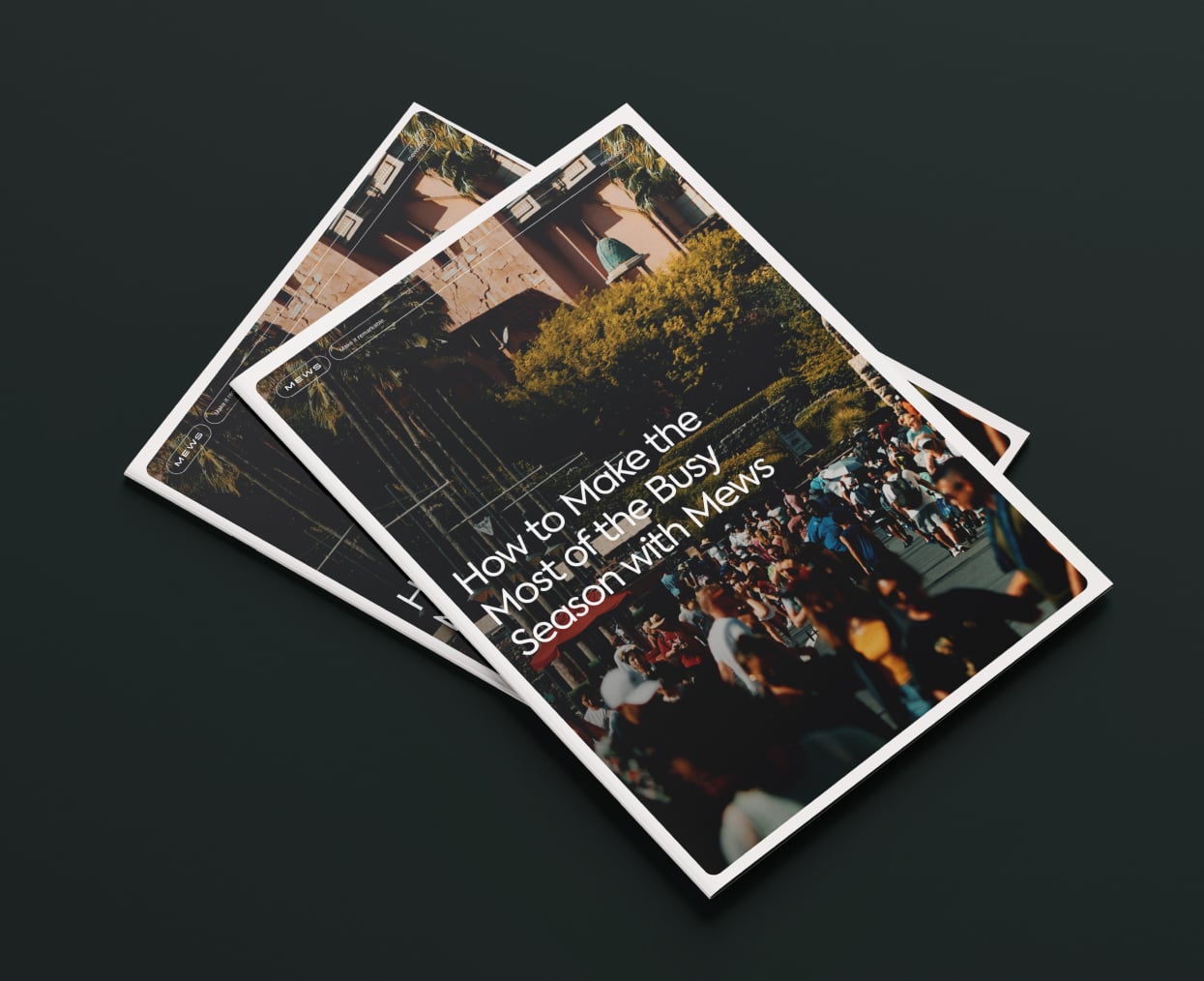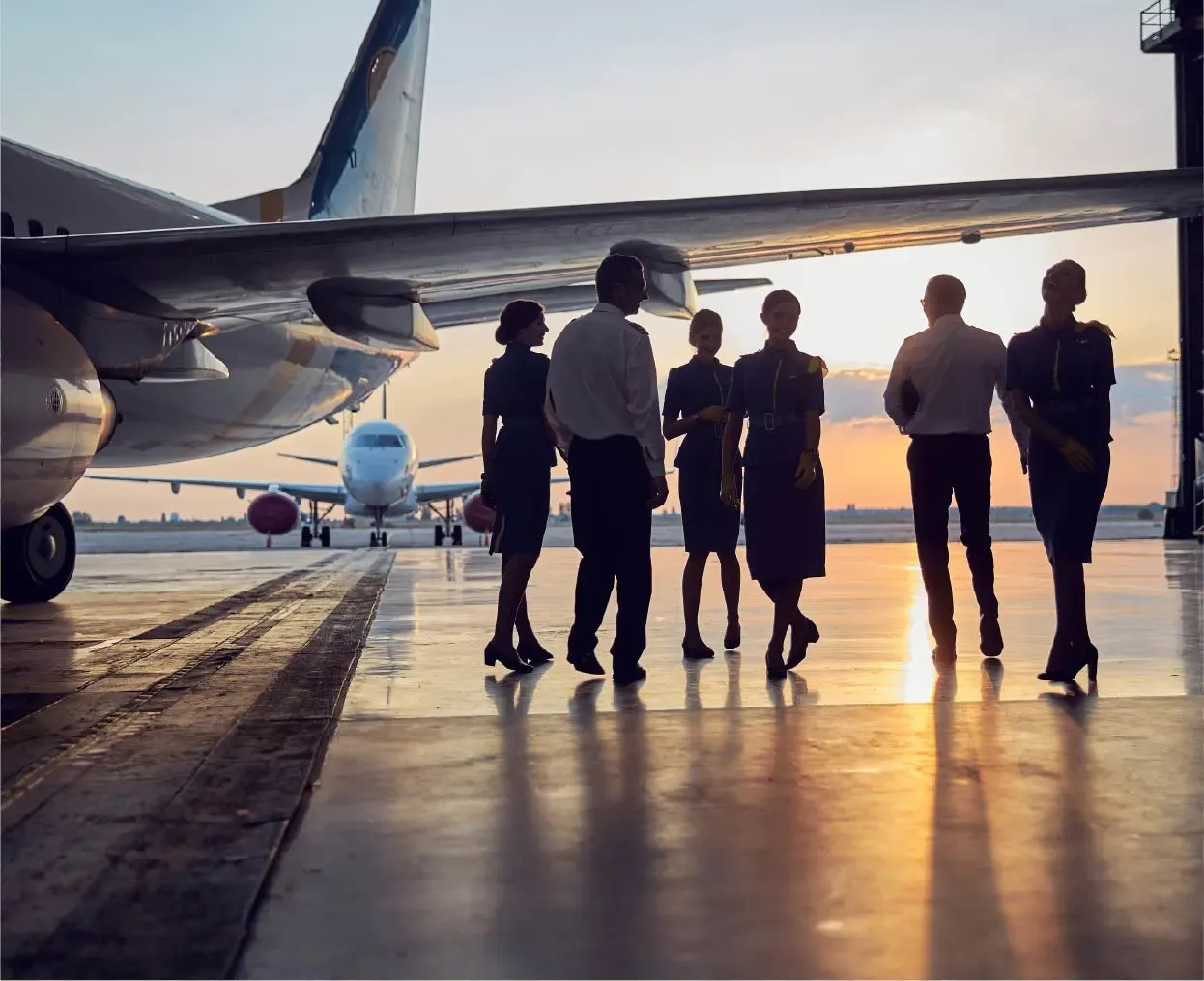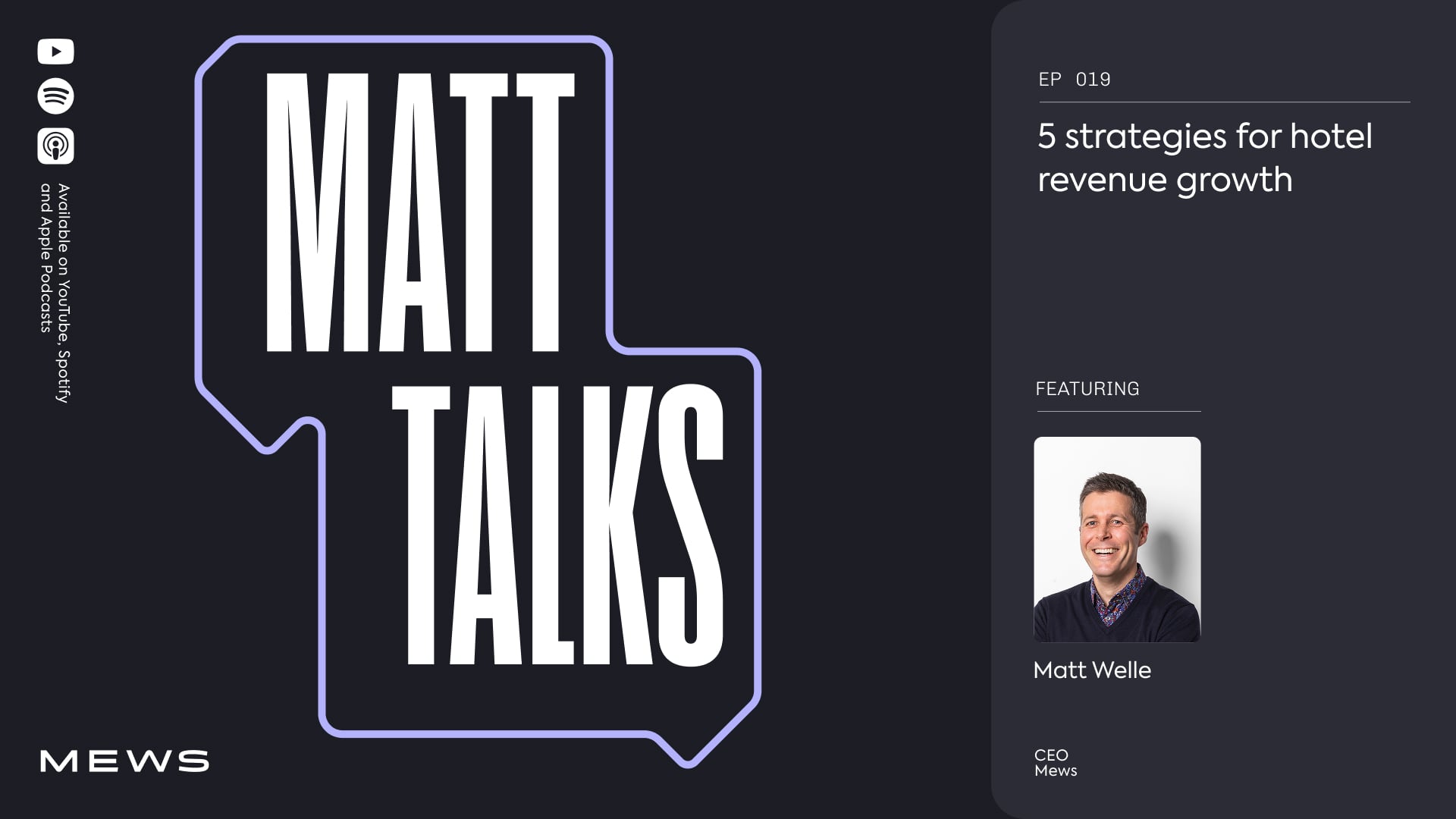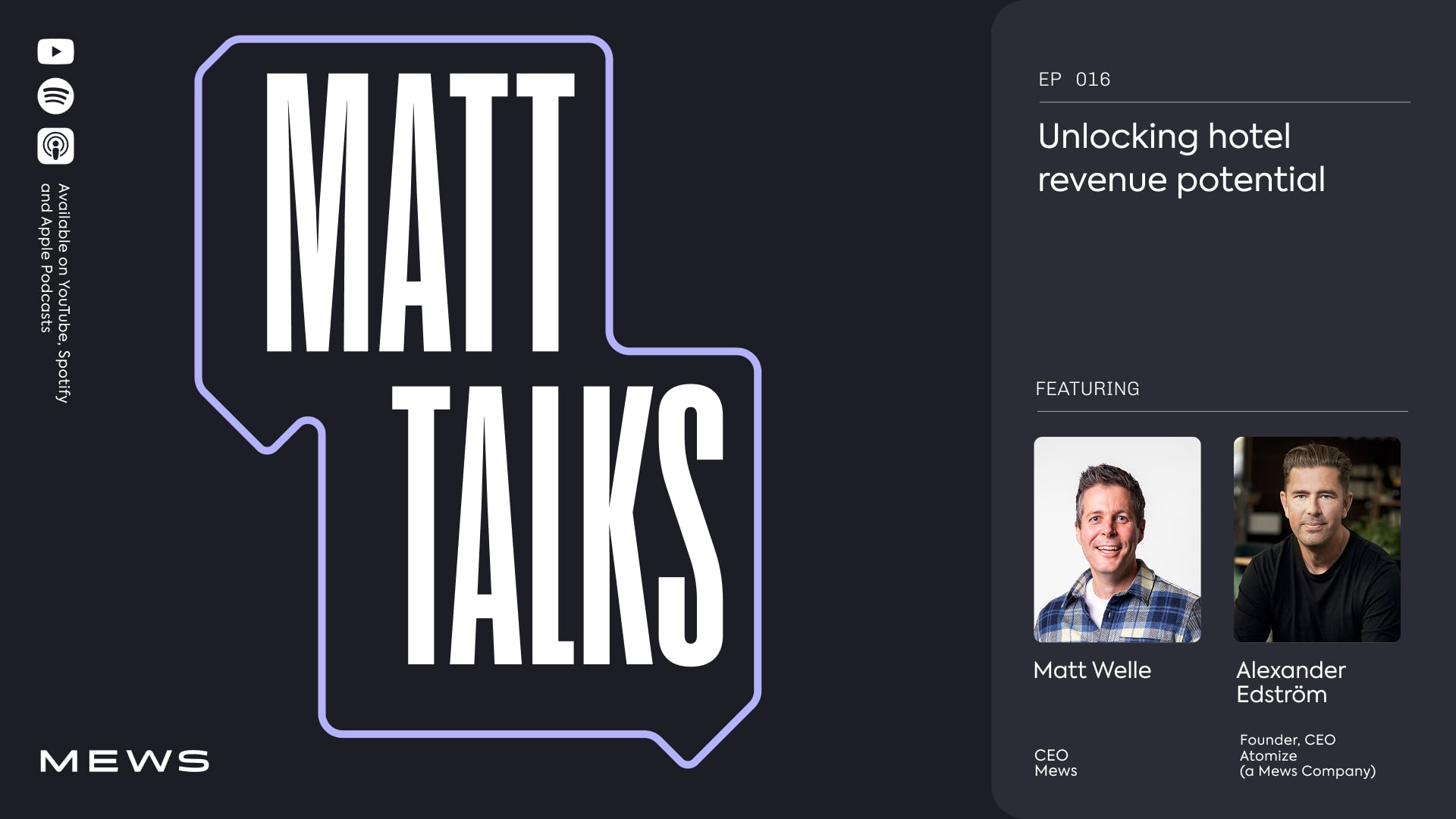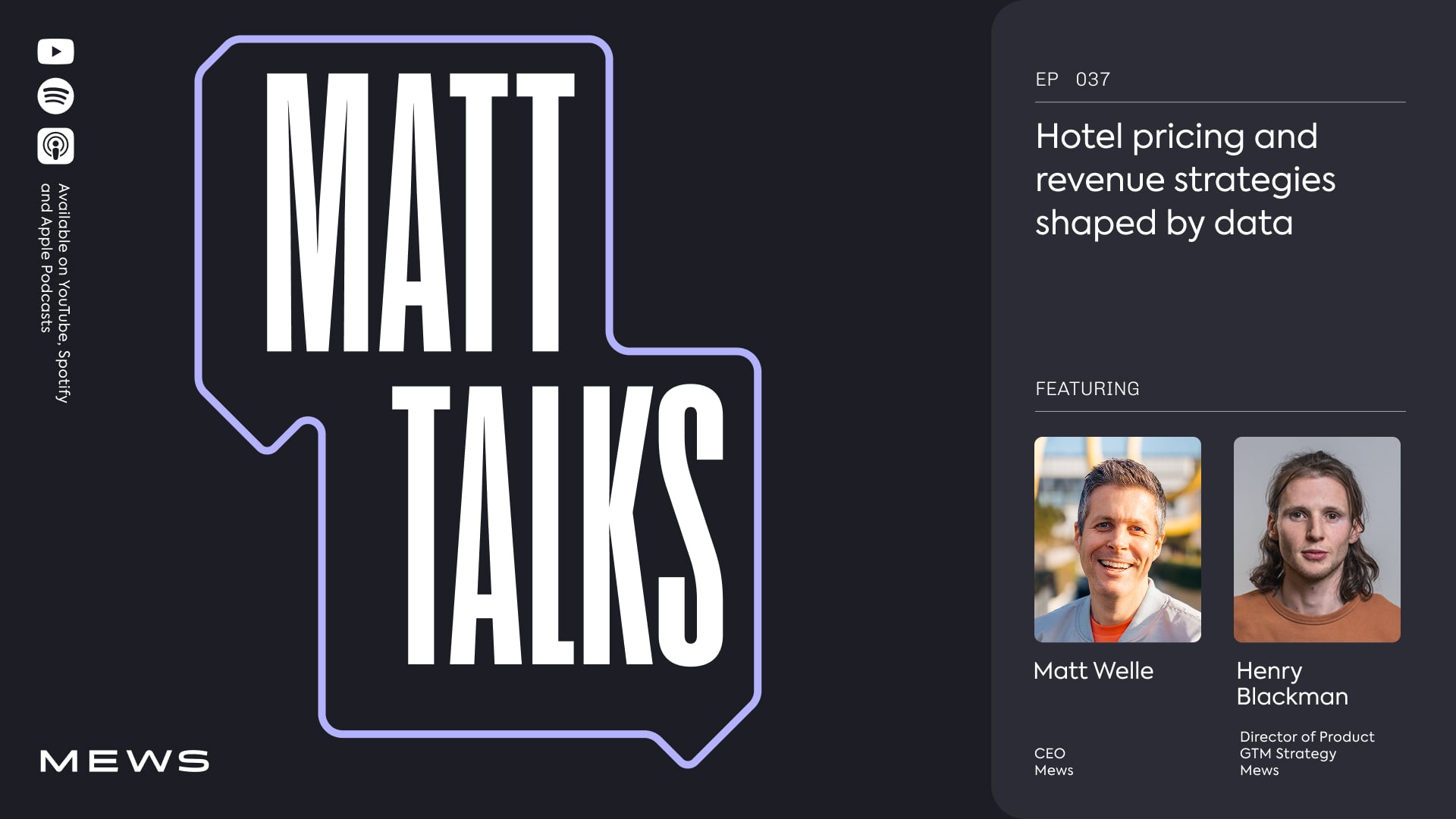What to expect?
Meet your host

Matthijs Welle
CEO, Mews
After years in the trenches of hospitality, Matt joined the Mews journey during its early days in 2013. Since then, he’s been our fearless CEO, leading the company and the industry forward.
Episode chapters
Transcript
Introduction to upselling in hospitality
Hi, everyone. This week in Matt Talks, I wanted to talk about upselling.
For the few decades that I've worked in hospitality, I remember that I've been taught to upsell. I have always found it incredibly hard to start a conversation with a guest about offering them a high category room. I felt shame or embarrassed to do that, because I couldn't imagine at that time that I would buy a suite, for example, because I didn't have the income. So I could not put myself into the shoes of a guest. And, throughout my travel career, I also very rarely see, a hotelier offering me an upgrade, but the computers consistently do. And sometimes I take it and sometimes I don't and my motivations change.
But one of the most important things is that upsells drive incremental revenue.
And it doesn't just do that. It also makes the experience that guests are having better because obviously we, we always think about, oh, I shouldn't be bothering my guest with upsells. But actually, if they're buying it, that means that there is a need that you're filling and that that's improving that guest experience. So in this Matt talk, I want to just talk about, first of all, analog versus digital, and and what what are we thinking about both of them?
But also how much is too much? Because nowadays with technology tools, I find that I get so many emails and they are just all over the place and in essence, and I just ignore them. And at some point you disengage your customers, your guests from the whole process. And it means that you also lower, for example, online checking numbers because they just ignore all of the emails.
So you have to be very deliberate about the moments when you do it. Maybe you make it part of a process. And I want to talk through some of that and give you some real examples of what products work and what products may not work as best for you at a specific time or journey of the guest. I hope you enjoy this.
So in this first block, I wanted to talk about the science of what works best. And there isn't real science behind this. This is things that I've learned seen in the data that we have. But there are distinct differences.
So first of all, when you get new employees at the reception desk and we see that there's a high amount of turnover of receptionists, their first priority is getting to know the system and getting really comfortable with the system before they start to focus on the guest experience. And only once they've got really comfortable with the system do they focus on the guest experience. And the guest experience doesn't necessarily mean upsell. It means just being able to serve the guests, together with, like, running the system in a nice way.
And then the last priority is always, like, doing more. So once they got really comfortable in their job and they know kind of the routine, that's when they can start to think about upsells. And when you look at the most successful people that are upselling, they're often the longest serving receptionists, in the team because they feel incredibly comfortable with the workflow.
So it's it with a high turnover, it's really hard to get consistent upsell results.
Another thing is some people just will never be great salespeople and they will never thrive as much training as you can give them. They'll never thrive at at doing upsells. But, if you do find those gems, the persons that are very successful could drive significant revenue, and you need to make sure that you have a really strong incentive plan for those people to drive those upsells.
Chapter
The shift to digital upselling
But where we see the real success is digitizing.
And I've talked previously about, the shift that happened in McDonald's when they replaced their, desks where humans were taking your orders and asking, Would you like fries for that? To kiosks.
And what they've seen is a significant shift in the types of orders. People might order three burgers and no fries. And they've seen a real shift, because people don't have shame to place an order, that they do feel when they place an order with a human.
It's much easier for them to just select products that they feel that they want to get.
And computers are consistent. They will one hundred percent make an offer of an upsell to a guest. So, whilst you have to train and retrain and retrain the humans at the reception desk to offer upsells, The computer, when you tell it to offer an upsell, it consistently happens. And if you think about airlines, I fly every single week. I am willing to pay a little bit extra for a seat with a little bit of extra space. And we do the same things in hotels.
If you have, rooms available earlier in the morning, for early arrival, people are willing to pay for this. We have a hotel in central London, and people pay a lot of money for an early arrival at nine AM in the morning because they just wanna go into their room and freshen up after the long flight. And this is an exact example of you paying in the airline for extra seat space in a hotel. We all want to arrive early, and I don't want to store my luggage. I just want to get into my room and freshen up before I go and explore the city. So, we find that the computers are just more diligent in following through, and that gives people a moment to think about it. And the lack of embarrassment or shame, really helps the sale.
There's different moments when you do upsells. So the first moment is obviously when the booking is made at the booking engine. So when a booking is inserted in the booking engine, we can add products because you wouldn't do a room upsell at this point because they've already selected the room type, but you can add different products. So for example, in the Mews Booking Engine, you could already say, you know, if they're coming for business, would you like a coworking desk? And they can already specify which days they would want the coworking desk. The the the the number the highest number of sales we've seen is breakfast, which makes complete sense because breakfast is one of those things that we all have to eat, and people buy it at time of booking.
You often know when you create the booking already whether you're gonna come by car or whether you come by airplane. So a transportation or parking, we see as really high volumes that they're adding in there. But you also already know if you're flying in from a long haul flight, early check-in fee is something really valuable for people at that moment because you often book the flights before you book the hotel. So the moment you know your flight time, you might wanna add a early arrival, fee, and that gives people the ability to check-in early for an additional fee.
And then if this is a, destination hotel where you have experiences.
So for example, we do some amazing hotels up in the Northern Lights. There, you might want to pre book some of those excursions. So a lot of those things are the larger purchases that make the trip, more enjoyable you make at point of entry.
Then we also offer an online check-in. So two days before arrival, we send an email out to customers saying it's time to check-in for your hotel.
And at this point, the expectations have changed because suddenly I'm already starting to pre think about what am I going to do at the hotel. So besides the standard breakfast and parking that you can offer, you can also think at the online check-in journey, maybe you want to have a sauna, booking slot or the karaoke room. Like you've turned that basement room into a karaoke space or a cinema room. Because by two days before arrival, you have a much clearer sense of what this trip is going to be. So you need to adopt the products to the experiences that these guests are going to or want to have at the hotel. And you want to entice them to stay at the hotel to spend their money rather than booking that somewhere else outside of the hotel. So this is a perfect moment to offer those products.
Then the third stage will be once they get to the hotel. So either they check-in at the reception with the human and then, hopefully, we will have trained them to upsell, or they will do this on the kiosk. And on the kiosk, we've seen real success from this early check-in fee because right now I am in the hotel and I really wanna get access to a room, and I really don't wanna leave my luggage in a storage room. So at this point, an early check-in fee is fantastic to offer, for example, to the guests. And we've started seeing real success with, with early check-in fees, for example.
So as I mentioned, the time when you offer what is really critical, and you need to think deeply about this, because it does matter. Because if you offer twenty products consistently in all of the journeys, all of the sales will come down because you're going to see disengagement from some of the offers that you have. One of the data points that we've seen is that these products that we're adding, not the not the room upgrades, but the products that we're adding, like breakfast and parking, one in twenty five guests will end up purchasing one. So, like like it's significant.
If you're a hundred bedroom hotel, you'll see fifty check ins. That means about two guests per day will buy and upgrade products, and they're between thirty and forty euros on average. And if you take that for a year, it's a significant amount of money that these guests will spend with you that they might have just spent somewhere else. So I would strongly definitely recommend investing into an upsell journey and invest in digitizing a lot of it because if they do that through a computer, versus with a human, we see that the average value of booking goes up when a kiosk checks a guest in versus a human checking a guest in.
And we should be deploying our humans to do much more exciting and fun things to create these guest experiences and let computers do what they do best. So this was just a short summary of kind of the psychology behind what works and what are some of the things to, to, to look out for.
Chapter
Types of upsells in hospitality
So in this next block, let's talk about the types of upsells that you can do. And, obviously the, the most expected one is the room upsell, where you, book a standard room. And then at some point you upgrade to a higher category of room. Here, often, I will upgrade to a room that has a nice view, especially if I'm traveling on leisure with two persons in the room, which means I'm taking my partner with me.
I'd like to surprise my partner with a room that has a really nice and special view. I don't really care that much about the space, but I do really care about the experience that we have in that room. And often views are something I'll pay extra for. So if you have categorized all of your rooms in one category, even the high floors with the nice views fall into the standard category, you should consider splitting them out into two categories.
The one room category with really nice views and the ones that are just the standard ones, because that allows you to upsell. And it doesn't have to be much, but, the upsell could be five, ten euros for a nicer view.
But it matters over time that one upsell might not be a huge amount, but if you add them up over a year, they significantly drive more revenue.
Obviously, most of the room upsells will be significant difference in value. So the average value for a room upsell is more than when you get a product upsell, But there's a volume difference that happens because the room upsells happen probably less often than adding on breakfast or adding on an early check-in fee, which are simple upgrades, but the volume of them makes a difference. But you should have both. You need to make sure that you have enough categories that you can offer guests to their upsell journey.
One of the things I used to do when I worked in hotels was really once per so many months, take a download of what the final, price was for all of the room categories, and making sure that you fill them equally so that if, you know, potentially there's some prices elasticity problem, that you've priced the suites too high, and you end up having to free upgrade into those categories. And you can start to see that from the patterns of the average value of the data. And you need to make sure that the upsell is set at the exact level that people are willing to pay for it. And all of this is dynamic nowadays.
So if you have a revenue management system, it should dynamically also price the upgrades.
But majority of hotels don't unfortunately yet have revenue management systems. So they have to do this manually, but you have to review this regularly. So if you have a standard upgrade from a a standard room to a suite of a hundred euros, and you're not selling, it isn't because the system isn't working, it's because you set the wrong price. Maybe you said, you know, not giving the right descriptions. Maybe the the photo isn't there. If you have an upselling strategy, you need to revise it very regularly. And that needs to be part of a quarterly review that you do to make sure that you constantly tweak because your guests change in different seasons and the the the way that they behave will also change with that.
Chapter
Creative upselling opportunities
So when you do, product upsells, so obviously, everyone thinks about the standard types of upsells.
I often speak to ateliers or even, alternative service providers. So So if you think about extended stays or Airbnbs, and those operators will say, we have nothing to upsell. If you are a budget hotel, for example, they'll say, we don't have anything to upsell because we are a budget hotel. And that's such a lost opportunity because there are some items that you could have in stock that are not really perishable, but that are high value that it's worth adding into that flow. So it could be, for example, a candle. Like we love these, like, very special candles that you can buy from a trip that that are a nice gift that you give away. Because if you have a if you cater to a lot of business travelers, they often have to come home with presents as I do.
And then the easiest thing to do would be to just purchase a present from the hotel. That could be a candle. That could be a local teddy bear that you offer if you have kids. And a lot of the business travelers have kids at home. So have a small selection of non perishable goods that could sit in storage and you don't lose value of over time.
Another thing is that a lot of people travel for, a occasion. So that could be an anniversary. That could be a birthday. That could be a romantic stay. You should have a romantic package. You should have a birthday cake directly in all of your upsells because people are purchasing this. And it's easier that they do this through the online journey than that they have to email the hotel.
You then have to tell them what the price is. You have to invoice them separately. This should be part naturally of the journey because a lot of people travel for special occasions and you need to cater to those occasions specifically.
And then always think about all of the spaces across the hotel. So we always think about the rooms and then adding breakfast and a parking, but we have so much flexible space in a hotel that we need to sell and fill. So if you do have space for a coworking space, just add a few desks that people can prebook, for example, for coworking.
Add that karaoke room and make it bookable because all of these products could be dynamically priced. Right? In Mews, you can load these products and these spaces in. They can be dynamically priced. So if, if the karaoke gets busy on a Saturday night at eight o'clock, which is very likely, the price should go up. And that makes it really exciting for you to start offering these upsell packages.
And one of the things you could do is, as guests have checked in, there's another upsell opportunity that happens that you can run through your CRM saying, send a SMS to the guest that, that offers them the karaoke room, for example.
So you can do a lot with, the different types of upsells, and really think creatively. If you are an Airbnb, how about a filled fridge? Right? Because often you arrive at these Airbnbs and there's maybe an espresso machine and a bottle of water.
But most likely these customers will now have to go to the supermarket to stock the fridge. So why not offer a stocked fridge?
It's a really nice upsell. They buy it beforehand so you can prepare for these things beforehand. And then we can make a really nice margin. And it all happens at point of entry, so you don't have to then come consistently back to the Airbnb.
If the Airbnb doesn't have any services, you could provide some tours because these people are coming for a stay in your destination. So why not work with a local tour guide that you can offer, tour guides or transfers, etcetera?
I believe that every single hotel has things to offer, and we just have to get more creatively, about how do we offer those products.
Everything you load into your upsells needs to have visualization.
What I often see is that you get a crappy photo of a champagne bottle and roses, on these upsells, which are stock photography.
It doesn't cost you anything to take your iPhone, to take a nice photo of a champagne bottle in the, environment of the room so that people visualize the, the experience that they're buying.
And it honestly, nowadays with iPhones, the quality of the photos is good enough to add those things into your upsell journey. If you just find someone who's passionate about taking photos, making sure that all of your upsell products have a photo that is not stock photography, it just helps sell it better because you can, once show it in the room so people can really imagine what this will look like if you buy the romantic package. Just put the rose petals and the nice bottle of champagne in the room so people can dream of, oh, this is a nice experience when my husband or my wife walks in for that experience.
And we have to take people onto on the dream of wanting to purchase some of these products.
Chapter
How AI can help upsell
And lastly, let's talk about AI because, a lot of the upsell that we're doing is very manual, very, much not driven by AI, but I think, it could change dramatically in this coming year. One of the things that I use AI for every single day is for inspiration.
I give it a prompt. If I feel I can't think of anything good to upsell and a lot of hoteliers always think, I don't have much to upsell. We are a budget hotel or we are an Airbnb. I can't think of anything.
And this is where AI comes in. So in this case, I gave it a prompt. So I went onto AI and I printed out the recommendation. So I said, I need some creative upsell ideas.
We are a city center hotel in Amsterdam during winter. What are some of the creative ideas that you can come up with?
And it's nice because it instantly came back with a number of excursions and tours. These are high value, ticket items, which are really interesting. So for example, it came with a private winter canal tour on exclusive boat with malt wine, heat heated blankets, and a private guide. I thought that was really nice.
You could do a skip the rain transfer service. So you could have a private driver when it rains to take you around to different locations around Amsterdam, like Volendam, where you can visit some Dutch villages, etcetera. You could do a stroopwafel, which is a, like, a local deli delicacy, a cooking class to do that.
What else do they have? Like a a golden hour rooftop, malt wine experience.
It AI is so good. You just have to give it the right context and it will give you suggestions that you can then incorporate into your guest experience.
Because really you should change the upsell offerings every quarter. As the seasons change, you should give it a refresh. It should look at what's working, what isn't working. And if it isn't working, then ask AI to give you a good recommendation for that particular product.
Secondly, machine learning is increasing as well. So we you saw Mews acquire, Atomize the revenue managements company a couple of months ago. And it's because we believe that we should help hoteliers drive autonomous pricing across all of the products. Right now, revenue management systems price bedrooms, but we think that everything with a price tag on it that hotel offers should be dynamically priced based on the demand that we're seeing for those particular products. And that means making them more affordable when it's low season and making them more expensive when there's a very high demand for some of those products, specifically for some of the spaces that we see where there's a limited, number of spaces. So when you see, for example, parking, a parking on a Saturday when the hotel is fully occupied should be more expensive than on a Tuesday when the hotel is running a fifty percent occupancy.
And it shouldn't be the humans driving this by hand because that will be really intensive if you have lots of products to do dynamic pricing.
This is where revenue management will come in, and this is where we're going to be focusing our attention with this amazing acquisition.
Another thing is we deeply integrate with great partners. One of those partners is One of those partners is a chat app that we've integrated with called rudder dot ai.
And they the moment we have the, the confirmation the guest reservation confirmed, they can start to communicate with that guest. So they can send an SMS or WhatsApp to that guest and start to say, Hey, we see that you don't have breakfast attached. Would you like to attach breakfast? Because they pull all of the reservation items and then they can start to personalize their messaging to the guests. If they see, for example, that it's a business traveler, they could suggest a co-working space or a meeting room, and you can just send a link to a booking engine directly to the guests. And if that's a leisure guest, maybe offer them booking the spa or karaoke room. And it's really important that you have these smart AI tools that can instantly learn what a guest is looking for, knows all of your services, and starts to, intuitively having those, services offered through the conversation.
So, I think a lot will happen in the next year with AI. And in those ateliers that are leaning into, working with these tools, we'll start to see a significant increase in revenue, But also the guests will see much more nicer personalized stays in these hotels because if they're willing to buy it, that means that there is demand for these products. And I think that's the thing that we often underestimate. We think we're bothering guests, but you aren't. You are delivering a service and you're accentuating that service through these great upsell products that you have.
Lastly, we talked about a lot of different stages at which you can sell these products.
I would strongly recommend you, you make a Miro board. Miro is a tool that we use to map out all of our different processes. And I'd say, create this board where you say, okay, all of the points of communication with the guests, map them out as to what you have today and what you would like to do. And, and really say at the point of booking, there's a confirmation email.
And, and those guests are really highly likely to engage. But if it's an OTA, we did, we see a drop off in, engaging with emails because OTAs are really good at shielding. So maybe that's where an SMS journey starts with the OTA guest. And really map out every piece of the journey.
Take a copy of the emails that you send out and the messages that you send out to make sure that branding is consistently because consistency is what will drive engagement. It doesn't feel like it's a phishing email that you're sending out to a guest. It's really beautifully, in line with your brand standard.
And then have the conversation with the team about what is too much. Is five emails too much?
Is two emails too much? And this is a personal, preference. And you can start to see, you can, you know, in one quarter, excuse me, in one quarter, run five emails.
Then what you see is that, okay, we're seeing disengagement happening. So try four emails the next quarter. And this is something where you just have to see the data and engage with the data and then really listen to it. This is not a, we deploy a new product and then we never look at it again and we just let it run, and then we're upset that it's not driving the results. This is the part of someone's job to regularly review and tweak and tweak and tweak to make sure that you get the most output from this, because this could be a very highly valuable line of business to the hotel in addition to just the standard room sales that you're doing, but it does require attention. I hope you enjoyed this. Thank you.



